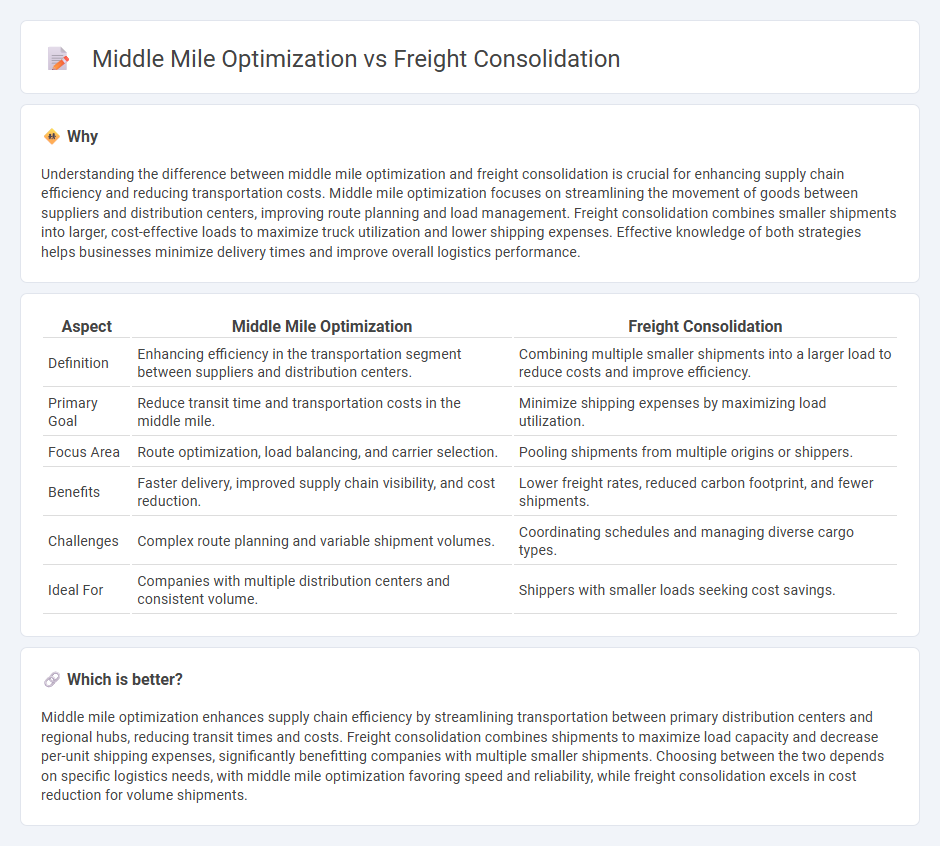
Middle mile optimization focuses on streamlining transportation between suppliers and distribution centers to reduce costs and transit times, leveraging route planning, load optimization, and real-time tracking technologies. Freight consolidation combines smaller shipments into larger loads, maximizing container utilization and lowering freight expenses by minimizing partial loads and enhancing carrier negotiation leverage. Explore detailed strategies and benefits of middle mile optimization and freight consolidation to boost your logistics efficiency.
Why it is important
Understanding the difference between middle mile optimization and freight consolidation is crucial for enhancing supply chain efficiency and reducing transportation costs. Middle mile optimization focuses on streamlining the movement of goods between suppliers and distribution centers, improving route planning and load management. Freight consolidation combines smaller shipments into larger, cost-effective loads to maximize truck utilization and lower shipping expenses. Effective knowledge of both strategies helps businesses minimize delivery times and improve overall logistics performance.
Comparison Table
| Aspect | Middle Mile Optimization | Freight Consolidation |
|---|---|---|
| Definition | Enhancing efficiency in the transportation segment between suppliers and distribution centers. | Combining multiple smaller shipments into a larger load to reduce costs and improve efficiency. |
| Primary Goal | Reduce transit time and transportation costs in the middle mile. | Minimize shipping expenses by maximizing load utilization. |
| Focus Area | Route optimization, load balancing, and carrier selection. | Pooling shipments from multiple origins or shippers. |
| Benefits | Faster delivery, improved supply chain visibility, and cost reduction. | Lower freight rates, reduced carbon footprint, and fewer shipments. |
| Challenges | Complex route planning and variable shipment volumes. | Coordinating schedules and managing diverse cargo types. |
| Ideal For | Companies with multiple distribution centers and consistent volume. | Shippers with smaller loads seeking cost savings. |
Which is better?
Middle mile optimization enhances supply chain efficiency by streamlining transportation between primary distribution centers and regional hubs, reducing transit times and costs. Freight consolidation combines shipments to maximize load capacity and decrease per-unit shipping expenses, significantly benefitting companies with multiple smaller shipments. Choosing between the two depends on specific logistics needs, with middle mile optimization favoring speed and reliability, while freight consolidation excels in cost reduction for volume shipments.
Connection
Middle mile optimization enhances freight consolidation by streamlining the transportation of goods between distribution centers and retail hubs, reducing transit times and costs. Effective freight consolidation leverages middle mile strategies to combine smaller shipments into full truckloads, maximizing vehicle capacity and minimizing fuel consumption. This interconnected approach results in improved supply chain efficiency, lower carbon emissions, and reduced operational expenses.
Key Terms
Load Pooling
Freight consolidation through load pooling maximizes trailer utilization by combining multiple shipments into fewer, fuller loads, significantly reducing transportation costs and carbon emissions. Middle mile optimization targets streamlining distribution routes between warehouses and retail locations, enhancing delivery speed and operational efficiency. Discover how load pooling reshapes logistics strategies and boosts supply chain performance.
Hub-and-Spoke Network
Freight consolidation in a hub-and-spoke network reduces transportation costs by grouping shipments at central hubs before dispatching them to final destinations, enhancing load efficiency and reducing travel frequency. Middle mile optimization focuses on streamlining these intermediate routes between distribution centers and hubs, leveraging data analytics and route planning to minimize transit times and fuel consumption. Explore how integrating both strategies can transform your supply chain operations for maximum efficiency and cost savings.
Route Planning
Freight consolidation involves combining multiple shipments into one load to reduce transportation costs, while middle mile optimization focuses on enhancing efficiency during the transportation phase between origin and destination hubs, particularly through advanced route planning techniques. Effective route planning in middle mile optimization leverages data analytics and GPS technology to minimize travel time, fuel consumption, and operational expenses, ensuring timely delivery and lower carbon emissions. Explore detailed strategies and tools used in route planning to fully optimize middle mile transportation in your supply chain.
Source and External Links
Understanding Freight Consolidation - SupplierWiki - Freight consolidation combines multiple small shipments into one larger shipment to reduce costs, maximize transportation capacity, and improve efficiency for both domestic and international shipping.
A Guide to Consolidation in Logistics - Freight consolidation merges many small loads into a single shipment going to a common destination, lowering shipping costs, reducing risk of damage, and minimizing environmental impact by using fewer trucks.
What is Freight Consolidation? Trinity Explains. - Freight consolidation combines regional shipments into a single load to leverage bulk freight rates, optimize logistics, save time, and reduce shipping expenses for shippers with smaller quantities.
 dowidth.com
dowidth.com